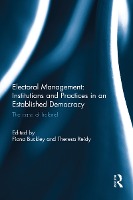Over the last three decades, electoral reform has moved centre stage in both new and established democracies. In Europe, the post 1989 democratisation wave brought important debates about electoral system choice and free and fair elections. But electoral reform also emerged on the agenda in a number of established democracies. Declining political participation, corruption scandals and party finance irregularities put the management of the democratic process on the political agenda. Election administration problems such as those in the Gore Bush election of 2000 thrust electoral integrity into the global political spotlight. In this edited collection, we are primarily concerned with the mechanics of how elections are run. Elections are complex administrative tasks and as International IDEA points out, they are also usually administered against a politically charged backdrop. This book brings together specialists to consider the election management process using diverse theoretical approaches and, addressing both emerging and perennial election debates such as the role of voter advice applications, election management bodies, districting, ballot design and media practices in the coverage of elections. The volume includes a number of comparative chapters which utilise data from large international datasets (VDem and CSES), several Irish case studies and an important Dutch study of voter advice applications with pioneering data. Collectively, the chapters provide insights into election administration in Ireland and many other established democracies. This book was previously published as a special issue of Irish Political Studies.

